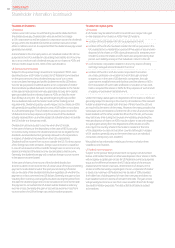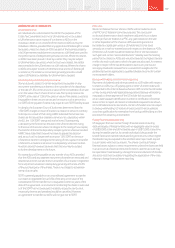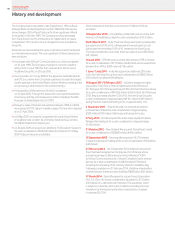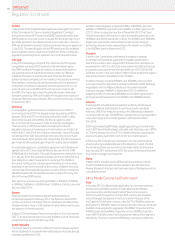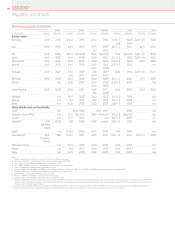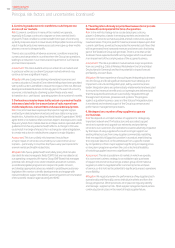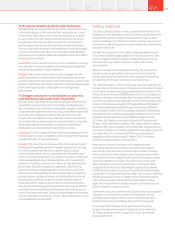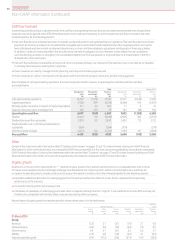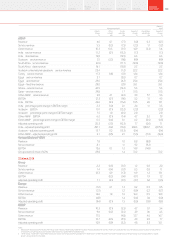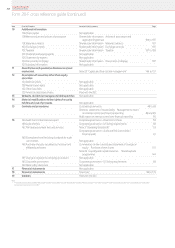Vodafone 2014 Annual Report Download - page 200
Download and view the complete annual report
Please find page 200 of the 2014 Vodafone annual report below. You can navigate through the pages in the report by either clicking on the pages listed below, or by using the keyword search tool below to find specific information within the annual report.
6. Continuing weak economic conditions could impact one
or more of our markets.
Risk: Economic conditions in many of the markets we operate,
especially in Europe, continue to stagnate or show nominal levels
of growth. These conditions combined with the impact of continuing
austerity measures results in lower levels of disposable income and may
result in signicantly lower revenues as customers give up their mobile
phones or move to cheaper tariffs.
There is also a possibility of adverse economic conditions impacting
currency exchange rates in countries where the Group has operations,
leading to a reduction in our revenue and impairment of our nancial
and non-nancial assets.
Assessment: This risk is evident across a number of our markets and
in particular within our southern European markets where it may
continue to have a signicant impact.
Mitigation: We are closely monitoring international economic and
currency situations. Executive Committee briengs have been provided
with specic actions identied to reduce the impact of the risk. We have
developed a detailed business continuity plan in the event of a country
economic crisis leading to a banking system freeze and a need
to transition to a “cash based” operating system for a number of months.
7. Our business may be impacted by actual or perceived health
risks associated with the transmission of radio waves from
mobile telephones, transmitters and associated equipment.
Risk: Concerns have been expressed that electromagnetic signals
emitted by mobile telephone handsets and base stations may pose
health risks. Authorities including the World Health Organization (‘WHO’)
agree there is no evidence that convinces experts that exposure to radio
frequency elds from mobile devices and base stations operated within
guideline limits has any adverse health effects. A change to this view
could result in a range of impacts from a change to national legislation,
to a major reduction in mobile phone usage or to major litigation.
Assessment: This is an unlikely risk; however, it would have
a major impact on services consumed by our customers in all our
markets– particularly in countries that have a very low tolerance for
environmental and health related risks.
Mitigation: We have a global health and safety policy that includes
standards for electromagnetic elds (‘EMF’) that are mandated in all
our operating companies. We have a Group EMF Board that manages
potential risks through cross sector initiatives and which oversees
a coordinated global programme to respond to public concern,
and develop appropriate advocacy related to possible precautionary
legislation. We monitor scientic developments and engage with
relevant bodies to support the delivery and transparent communication
of the scientic research agenda set by the WHO.
8. The integration of newly acquired businesses do not provide
the benets anticipated at the time of acquisition.
Risk: In line with its strategy to be a scale data player, a strong
player in Enterprise, a leader in emerging markets and a selective
innovator in services; we have acquired, and will continue to acquire,
new businesses. The price paid for these businesses is based upon their
current cash ows, as well as the expected incremental cash ows that
will be generated from increased revenues and lower costs that being
part of the Vodafone Group will generate. There is a risk that we fail
to deliver these expected benets and synergies which could result
in an impairment of the carrying value of the acquired business.
Assessment: This risk is possible in markets where major acquisitions
have occurred (e.g. Cable & Wireless Worldwide in the UK and Kabel
Deutschland in Germany) and has the potential to impact forecast
protability and cash ows.
Mitigation: We have experience of acquiring and integrating businesses
into the Group and for all signicant transactions we develop and
implement a structured integration plan, led by a senior business
leader. Integration plans are systematically implemented and executed
to ensure that revenue benets and cost synergies are delivered and
that the acquired businesses are successfully integrated through
the alignment of policies, processes and systems. The progress
against acquisition business cases and the status of integration plans
is monitored and reviewed as part of the Group’s governance and
performance management procedures.
9. We depend on a number of key suppliers to operate
our business.
Risk: We depend on a limited number of suppliers for strategically
important network and IT infrastructure and associated support
services to operate and upgrade our networks and provide key
services to our customers. Our operations could be adversely impacted
by the failure of a key supplier who could no longer support our
existing infrastructure; from a key supplier commercially exploiting
their monopolistic/oligopolistic position in a product area following
the corporate failures of, or the withdrawal from, a specic market
by competitors; or from major suppliers signicantly increasing prices
on long term programmes where the cost or technical feasibility
of switching supplier becomes a signicant barrier.
Assessment: This risk is possible in all markets in which we operate.
It is a common business strategy to consolidate major purchases
of equipment and services amongst a select group of international
suppliers in order to negotiate better commercial terms and level
of service; so this risk has the potential to signicantly impact operations
or protability.
Mitigation: We regularly review the performance of key suppliers, both
operationally and nancially, across individual markets and from the
Group perspective. Other processes are in place to regularly identify
and manage “suppliers at risk”. Most supplier categories have business
continuity plans in place in the event of single supplier failure.
Vodafone Group Plc
Annual Report 2014198
Principal risk factors and uncertainties (continued)


